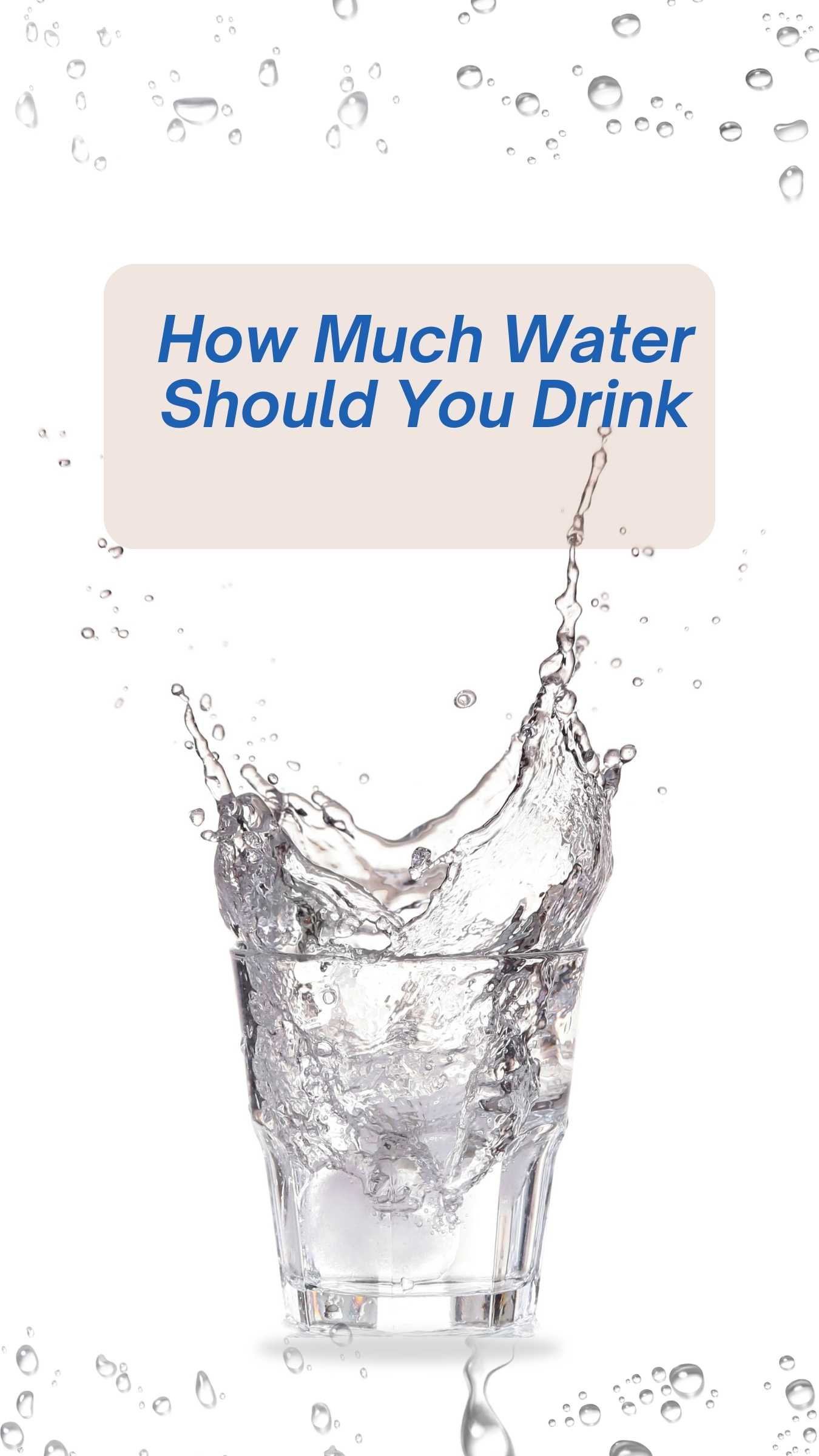You should drink one ounce of water for every two pounds of body weight. To calculate your needed water intake, simply weigh yourself and divide the number of pounds by two.
This weight-based rule applies to everyone, but some individuals may need less or more water depending on their specific circumstances.
Factors Affecting Water Intake
Factors affecting water intake can vary based on individual needs, such as weight, activity level, and environment. It is generally recommended to drink one ounce of water for every two pounds of body weight. However, some people may require less or more water intake.
Factors Affecting Water Intake
When it comes to staying hydrated, there are several factors that can influence the amount of water you should be drinking each day. These factors include age, weight, gender, physical activity level, climate and environment, as well as any underlying health conditions. By understanding how these factors affect your water intake, you can ensure that you are adequately hydrating your body to support optimal health and well-being.
Age, Weight, And Gender: How They Influence Your Daily Water Needs
The amount of water your body needs can vary based on factors such as your age, weight, and gender. Generally, adults should aim to drink between 8 to 12 cups (64 to 96 ounces) of water per day. However, this recommendation may vary depending on individual characteristics. It is important to note that children and older adults may have different water intake needs.
Physical Activity Level: The Impact Of Exercise On Your Water Intake
Engaging in physical activity can increase your body’s water requirements. When you exercise, your body loses water through sweat, which needs to be replenished to maintain proper hydration levels. As a general guideline, it is recommended to drink an additional 1 to 2 cups (8 to 16 ounces) of water for every hour of moderate-intensity exercise. If you are engaging in intense or prolonged exercise, you may need to increase your water intake even more.
Climate And Environment: Understanding How Weather Conditions Affect Hydration
The climate and environment you are in can also impact your water needs. In hot and humid conditions, your body tends to sweat more to cool down, leading to increased water loss. In such situations, it is crucial to drink more water to prevent dehydration. On the other hand, cold and dry climates can also cause increased fluid loss through respiration. Therefore, it is essential to increase your water intake to compensate for these fluid losses.
Health Conditions: How Certain Medical Conditions Affect Your Water Requirements
Certain medical conditions can affect your body’s water requirements. For instance, individuals with kidney stones or urinary tract infections may be advised to increase their water intake to help flush out toxins and prevent further complications. Additionally, people with diabetes may need to be mindful of their water intake to maintain stable blood sugar levels. It is important to consult with your healthcare provider to determine the appropriate amount of water intake based on your specific health condition.
In conclusion, understanding the factors that affect your daily water intake is crucial for maintaining proper hydration levels. By considering your age, weight, gender, physical activity level, climate and environment, and any underlying health conditions, you can ensure that you are providing your body with the necessary amount of water to function optimally. Remember, staying hydrated is essential for overall health and well-being, so prioritize drinking enough water throughout the day.
| Factor | Recommended Water Intake |
|---|---|
| Age, weight, and gender | 8-12 cups (64-96 ounces) per day for adults |
| Physical activity level | Additional 1-2 cups (8-16 ounces) per hour of moderate-intensity exercise |
| Climate and environment | Drink more water in hot and humid conditions |
| Health conditions | Consult with healthcare provider for specific recommendations |
Recommended Daily Water Intake Guidelines
Proper hydration is essential for maintaining overall health and well-being. However, many people wonder how much water they should be drinking each day. In this article, we will explore the recommended daily water intake guidelines to help you understand your body’s hydration needs.
General Guidelines: Understanding The Standard Recommendations For Water Consumption
When it comes to determining your daily water intake, there are general guidelines that can provide a starting point. The most commonly recommended approach is to drink at least eight 8-ounce glasses of water per day, which amounts to about 2 liters or half a gallon.
It’s important to note that these guidelines may vary depending on various factors, such as your age, sex, activity level, and overall health. For example, pregnant or breastfeeding women may need to consume more water to support their increased hydration needs.
Weight-based Water Intake: The Relationship Between Body Weight And Water Requirements
Calculating your water intake based on your body weight can provide a more accurate estimate of your hydration needs. The general rule of thumb is to drink one ounce of water for every two pounds of body weight.
To determine your specific water intake, start by weighing yourself. Then, divide your weight in pounds by two. The resulting number is the amount of water, in ounces, you should aim to drink each day. For example, if you weigh 150 pounds, you would aim to consume 75 ounces (or approximately 2.2 liters) of water daily.
Customized Calculations: How To Calculate Your Specific Water Intake Based On Your Weight
To simplify the process of calculating your water intake, you can make use of online tools available. These tools usually require you to input your weight, activity level, and other relevant information. They will then generate a personalized recommendation for your daily water consumption.
By using these customized calculations, you can ensure that you are adequately hydrating your body based on your individual needs.
Hydration Calculator: Utilizing Online Tools To Determine Your Daily Water Needs
Online hydration calculators are a convenient way to determine your specific daily water needs. These tools take into account factors such as your weight, activity level, and climate conditions to provide you with a recommended water intake.
When using a hydration calculator, make sure to provide accurate information to ensure the most accurate results. Remember that these calculations are estimates, and it’s always essential to listen to your body’s cues for thirst and adjust your water intake accordingly.
Benefits Of Drinking Sufficient Water
Drinking sufficient water has numerous benefits for overall health and well-being. To determine how much water you should drink, a general rule is to consume one ounce of water for every two pounds of body weight. Calculate your needed water intake by dividing your weight in pounds by two.
Improved Physical Performance: How Adequate Hydration Enhances Athletic Performance.
Proper hydration plays a crucial role in optimizing physical performance, whether you’re a professional athlete or a casual gym-goer. When you exercise, your body loses water through sweat, leading to a decrease in blood volume. This reduction in blood volume can negatively impact your body’s ability to deliver oxygen and nutrients to your muscles, hindering your performance and increasing the risk of fatigue.
By drinking sufficient water, you can maintain optimal hydration levels and prevent these performance setbacks. Staying adequately hydrated helps to maintain blood volume, which means your muscles receive the necessary oxygen and nutrients needed to perform at their best. Proper hydration also helps regulate your body temperature, preventing overheating during intense workouts.
Enhanced Brain Function: The Effects Of Hydration On Cognitive Abilities And Focus.
Did you know that even mild dehydration can impair brain function? Research has shown that dehydration affects various cognitive abilities, including memory, attention, and concentration. When you don’t drink enough water, the brain tissue shrinks temporarily, affecting its efficiency and causing difficulty in performing cognitive tasks.
By maintaining proper hydration, you can enhance brain function and boost your cognitive abilities. Drinking enough water helps ensure that your brain receives a steady supply of oxygen and nutrients, allowing it to function optimally. Stay hydrated to stay sharp and focused throughout the day, whether you’re studying for an exam or working on a complex project.
Digestive Health: The Role Of Water In Maintaining A Healthy Gastrointestinal System.
Water plays a vital role in maintaining a healthy digestive system. It helps with the digestion, absorption, and transportation of nutrients and aids in the elimination of waste products. When you’re dehydrated, your body may struggle to break down food effectively, leading to issues such as constipation and bloating.
By drinking an adequate amount of water, you can promote healthy digestion and prevent digestive problems. Water helps soften stool, making it easier to pass, and ensures the smooth movement of food through your digestive tract. It also supports the production of digestive juices and enzymes needed for proper digestion. Keep your gastrointestinal system functioning optimally by staying hydrated throughout the day.
Skin Health: The Impact Of Hydration On Maintaining A Youthful And Glowing Complexion.
Want to achieve that coveted youthful and glowing complexion? Look no further than proper hydration. Water is essential for maintaining healthy skin, as it helps to moisturize and nourish the skin cells from within. Dehydration can lead to dryness, dullness, and an increased risk of skin issues like acne and wrinkles.
When you drink enough water, you provide your skin with the moisture it needs to appear plump, hydrated, and radiant. Water helps in flushing out toxins from the skin, promoting a clearer complexion. It also supports the natural production of collagen, a protein that keeps the skin elastic and helps prevent premature aging.
Make sure to drink sufficient water daily to achieve that healthy and glowing skin you’ve always desired.
Signs Of Dehydration And Its Consequences
Maintaining proper hydration is essential for overall health. The amount of water you should drink each day depends on factors like weight, activity level, and climate. A general rule is to drink one ounce of water for every two pounds of body weight.
Dehydration occurs when your body loses more fluids than it takes in. It can happen for various reasons, such as intense physical activity, heat exposure, or even simply forgetting to drink enough water throughout the day. Recognizing the signs of dehydration is crucial, as it can lead to severe health complications if left untreated.
Common Symptoms: Recognizing The Signs Of Mild To Severe Dehydration
Dehydration can manifest in several ways, ranging from mild to severe symptoms. By being aware of these signs, you can take prompt action to rehydrate your body. Some common symptoms of dehydration include:
- Thirst
- Dry or sticky mouth
- Dark, concentrated urine
- Fatigue or dizziness
- Headaches
- Dry skin and lips
- Muscle cramps
Health Risks: Understanding The Potential Risks And Complications Of Chronic Dehydration
Although mild dehydration can be resolved with proper hydration, chronic dehydration can lead to serious health risks and complications. Some potential risks include:
- Urinary tract infections: Without sufficient water intake, the urinary tract becomes susceptible to bacterial infections.
- Kidney stones: Inadequate water consumption can lead to the formation of kidney stones, causing severe pain and potential kidney damage.
- Heatstroke: During periods of intense physical activity or exposure to high temperatures, inadequate water intake can increase the risk of heatstroke.
- Impaired cognitive function: Dehydration can impair memory, focus, and overall cognitive function, affecting your daily performance.
Impact On Bodily Systems: How Dehydration Affects Different Organs And Functions
Dehydration doesn’t just affect your overall well-being; it can have a significant impact on various bodily systems and functions. Here’s how dehydration can affect different organs:
| Organ/Function | Impact of Dehydration |
|---|---|
| Brain | Reduced cognitive function, fatigue, and impaired concentration |
| Heart | Increased heart rate and decreased blood volume, leading to cardiovascular strain |
| Kidneys | Reduced urine output and potential kidney damage |
| Skin | Dry, parched skin, and decreased sweat production, hindering the body’s ability to cool down efficiently |
Prevention And Treatment: Strategies To Prevent And Manage Dehydration
Preventing and managing dehydration involves adopting simple yet effective strategies in your daily routine. Here are some practical tips to stay hydrated:
- Drink water regularly throughout the day, even if you don’t feel thirsty.
- Carry a reusable water bottle with you to ensure access to water wherever you go.
- Monitor your urine color – a pale yellow color indicates good hydration.
- Increase your water intake during periods of intense physical activity or high temperatures.
- Consume water-rich foods, such as fruits and vegetables.
By incorporating these preventive measures, you can maintain adequate hydration levels and minimize the risk of dehydration-related complications.
Remember, staying hydrated is not just a matter of quenching your thirst. It is essential for overall health and well-being, as dehydration can have serious consequences. Recognizing the signs, understanding the risks, and taking proactive steps to prevent and manage dehydration are vital for maintaining optimal health.
Tips For Staying Hydrated Throughout The Day
Staying hydrated is essential for maintaining optimal health and well-being. Proper hydration helps regulate body temperature, support digestion, promote healthy skin, and improve overall bodily functions. Here are some practical strategies, hydration hacks, monitoring tools, and hydrating alternatives to help you stay hydrated throughout the day.
Practical Strategies: Easy Ways To Increase Your Water Intake On A Daily Basis
- Carry a reusable water bottle with you wherever you go. This will serve as a visual reminder to drink water throughout the day.
- Set reminders on your phone or computer to take regular water breaks.
- Add flavor to your water by infusing it with fruits, herbs, or cucumber slices.
- Drink a glass of water before each meal to help control portion sizes and facilitate digestion.
- Eat water-rich foods, such as watermelon, cucumbers, and oranges, to increase your overall water intake.
Hydration Hacks: Creative Ways To Incorporate Hydration Into Your Routine
- Start your day with a glass of water. Keep a glass or bottle by your bedside to drink first thing in the morning.
- Drink water while you exercise. Hydrate before, during, and after your workout to replenish lost fluids.
- Set hydration goals. Challenge yourself to drink a certain amount of water by specific times throughout the day.
- Try herbal teas or infused water for a change of taste and added hydration benefits.
- Use an app or tracker to monitor your water intake and receive reminders to drink water throughout the day.
Monitoring Your Water Consumption: Tools And Apps To Track Your Daily Water Intake
Monitoring your water consumption can help you stay accountable and ensure you’re meeting your hydration goals. Here are some tools and apps that can assist you:
| Tool/App | Description |
|---|---|
| WaterMinder | An app that tracks your daily water intake and sends reminders to drink more water. |
| Hydro Coach | A water tracking app that calculates your daily water needs based on your weight and activity level. |
| Fitbit | A fitness tracker that monitors various health metrics, including water intake. |
| MyFitnessPal | An all-in-one health and fitness app that allows you to log your water intake along with your meals and exercises. |
Hydrating Alternatives: Other Beverages And Foods That Contribute To Hydration
While water is the best choice for staying hydrated, other beverages and foods can also contribute to your daily water intake. Here are some hydrating alternatives:
- Herbal teas
- Coconut water
- Cucumber-infused water
- Watermelon
- Oranges
- Leafy greens
- Soup broth
Remember, maintaining proper hydration is crucial for your overall health and well-being. By following these tips and incorporating them into your daily routine, you can ensure that you stay hydrated throughout the day.


Credit: www.developgoodhabits.com
Frequently Asked Questions Of How Much Water Should You Drink
How Much Water Should You Drink Based On Your Weight?
To determine how much water you should drink based on your weight, follow this guideline: drink one ounce of water for every two pounds of body weight. Simply weigh yourself and divide that number by two to find your recommended water intake.
What Is The Ideal Water Intake Per Day?
The ideal water intake per day varies based on your weight. The general rule is to drink one ounce of water for every two pounds of body weight. To calculate your needed water intake, weigh yourself and divide the number of pounds by two.
How Many Oz Of Water Should I Drink A Day?
To determine how much water you should drink a day, use the weight-based rule: drink one ounce of water for every two pounds of body weight. Simply weigh yourself and divide the number of pounds by two to find your needed water intake.
Is 4 Liters Of Water A Day Too Much?
Drinking 4 liters of water a day may be too much for some people. The general rule is to drink one ounce of water for every two pounds of body weight. Calculate your needed water intake by dividing your weight in pounds by two.
Conclusion
To ensure proper hydration, it’s essential to know how much water you should drink each day. While the ideal amount may vary based on factors like weight and activity level, a general rule is to consume one ounce of water for every two pounds of body weight.
By calculating your weight and dividing it by two, you can determine your required daily water intake. Remember, proper hydration offers numerous benefits and helps maintain overall well-being. So, make sure to prioritize drinking enough water to keep your body functioning optimally.

